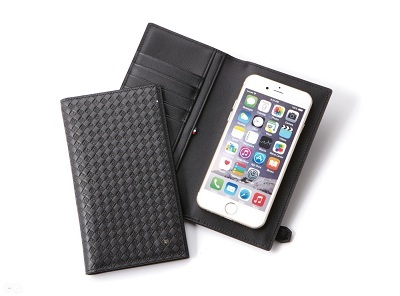With the rise of plastic cards and smartphone applications in everyday transactions, Korean consumers have little need for cash -- or full-sized wallets.
Data shows that consumer preferences are turning more toward smaller, thinner wallets whose primary function is to hold plastic cards.
According to online marketplace Gmarket, sales of card wallets and money clips surpassed that of half- and full-sized wallets in 2014 and 2015.
In 2010, card wallets and money clips had represented just 10 percent of all wallet sales on Gmarket.
“Smartphone cases can now replace most wallets, and digital methods of payment have caused demand for bulky full-sized or half-sized wallets to fall,” said a spokesman for Gmarket.
 |
Bruno Magli’s smartphone wallet Unika |
Consumer demand for slim options has affected design as well. Accessory brands that traditionally focused on creating handbags and full-sized wallets have begun to release more “smartphone wallets,” which add slots for plastic cards to cellphone cases.
Handsome’s brand Decke partnered with smartphone wallet brand Lamatree to release a line of wallets custom-made for carrying smartphones and cards.
By adding a soft inner casing in various sizes to accommodate different phone models, the Decke line allows consumers to invest in a quality wallet without worrying about it becoming useless once they switch smartphone models.
Leather goods maker Bruno Magli also came out with a line of smartphone pouches called “Unika,” which is essentially a smartphone case that could double as a wallet.
In addition to becoming more compact, wallet designs are becoming “smarter,” with functions that make life more convenient for consumers whose transactions are becoming increasingly cashless.
Last year, accessory brand Couronne became the first in the industry to introduce a “smart” accessory line called Clipass. The line is designed for consumers who carry multiple cards in their wallets, but use just one card for tap transactions.
Clipass wallets have a small card-sized pocket that is made with a different material from the rest of the wallet. When the wallet is tapped against a sensor, such as those found on Korean subways or buses, only the card in the pocket is read for the transaction. This allows the user to complete transactions without interference from the other digital cards in the wallet.
Bean Pole Accessories released a new line of card-holders with neck chains with similar technology, bypassing wallets altogether.
By Won Ho-jung (
hjwon@heraldcorp.com)
captions:
Couronne’s Clipass wallet with a special card slot
Bruno Magli’s smartphone wallet Unika








